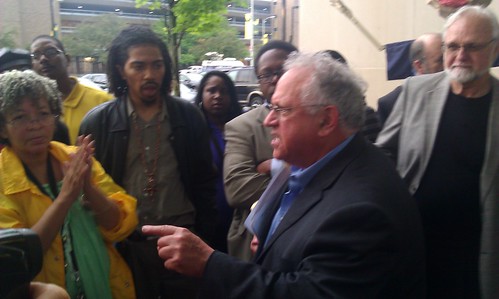
Atty. Jerome Goldberg reports on his questioning of the Emergency Manager Kevyn Orr outside the WSU Law School on June 10, Moratorium NOW! had called for the protest. (Photo: Abayomi Azikiwe) , a photo by Pan-African News Wire File Photos on Flickr.
Detroit Labor Groups Butt Heads With Bondholders Over City's Debt
By SARAH CWIEK
Originally published on Wed June 19, 2013 10:18 pm
Transcript
ROBERT SIEGEL, HOST:
The financial future of Detroit lies in the hand of a state-appointed emergency manager, Kevyn Orr. He's trying to wring concessions out of the city's creditors before deciding whether to file for bankruptcy on the city's behalf. Orr is proposing shared sacrifice among all creditor groups. That means some will get back just pennies on the dollar. And all of the creditors are fighting each other for those pennies as Michigan Radio's Sarah Cwiek reports.
SARAH CWIEK, BYLINE: Last week, Kevyn Orr laid it out like this: If Detroit owes you money, you're not getting it all back. Painting it in stark terms, Orr said the city just has to renege on some promises. So he made a proposal, one that sounded more like a close shave for creditors rather than the traditional financial haircut.
KEVYN ORR: Our proposal to have re-investment in the city and, frankly, a proposal for how we will treat the legacy obligations, both the debt side and the labor and benefits side.
CWIEK: By legacy obligations, Orr meant the more than $11 billion in unsecured debt that Detroit owes. Unsecured debt doesn't have anything backing it up other than a promise of future payment. And as Orr made clear, that promise is now being broken. Now, the holders of this debt fall into two major groups. There are the regular municipal bondholders, who as of last Friday, Detroit has stopped paying. We'll talk more about them in a minute.
But then there's the labor and benefits side, the pensions and health care promised to roughly 20,000 city retirees, people like retired police officer William Gray, who had more than 25 years on the force. But he's only 56 years old and nine years from being eligible for Medicare.
WILLIAM GRAY: I'm taking four medications a month, so I am concerned about paying more in terms of health care.
CWIEK: Gray also has two young kids and says he needs every dime he had planned on for his retirement.
GRAY: If concessions have to be made, I think that they can find other areas to make them.
CWIEK: The city's pension fund has already set aside millions of dollars to fight Orr for their share. But remember those holders of Detroit's municipal debt? They want some of those dimes, too, and some of them already aren't getting paid. Fitch's credit rating agency downgraded more than $1 billion worth of Detroit's debt to a D-grade last week. That's D for default.
ARLENE BOHNER: Any time an issuer decides not to honor their obligation to repay the holders of their debt, that's a big deal.
CWIEK: That's Arlene Bohner, a municipal bonds analyst for Fitch's. She says it's a big deal for two main reasons. The first is that it undermines the assumption of a rock-solid municipal bond market, the implicit guarantee that if you invest in muni bonds, you'll get paid in full and on time. The second reason, Bohner says, is that Orr's proposal attacks all kinds of municipal debt with the same blunt instrument.
It's complicated stuff, but in general, some municipal debt is considered more rock solid than others. Orr's suggested remedy throws those considerations out the window. And that could change how bond analysts calculate risk, and that could change how cities raise money for projects.
Some fear Kevyn Orr's approach will throw bond markets violently out of whack, with huge repercussions for cities. But Cate Lowe, who blogs about municipal finance issues for Reuters, thinks those concerns are a bit overblown.
CATE LOWE: People in the bond market have watched Detroit struggle over the last few years, and so the bond market, the municipal bond market has seen this coming for a long time.
CWIEK: Lowe does call Orr's vision for doling out creditor losses a pretty radical interpretation of bankruptcy law. But it's a loss most bondholders won't have to suffer because they're insured by third parties. So people like William Gray could end up bearing the brunt of Detroit's restructuring.
LOWE: What we're just seeing now is just kind of the war that happens when the pie shrinks and people are fighting over the remains.
CWIEK: Kevyn Orr is still talking about getting people to sit down and make some collaborative decisions outside of bankruptcy court. But some creditors are starting to feel like they might do better there. And the more bitter this fight becomes, the more likely that option appears. For NPR news, I'm Sarah Cwiek in Detroit.
Transcript provided by NPR, Copyright NPR.
No comments:
Post a Comment